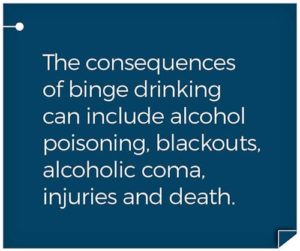- Jul 6
- AddictionAlcohol Addiction TreatmentDrug Detox
People tend to think of alcoholism as an all-or-nothing proposition. The perception is if a person can maintain a job and a life that is not falling apart, then they do not have a problem. The reality, however, is a lot less black and white: alcohol addiction is a progressive disease with many different degrees. Binge drinking is just one of the many.
Expert Insight on Binge Drinking
Substance abuse treatment expert Craig Lamb, clinical director of Gateway’s Chicago programs, explains binge drinking and the degrees of alcohol use disorder.
 Any level of alcohol abuse presents serious dangers. Data shows 60 percent of fatal burns, drownings, and homicides; 50 percent of sexual assaults and 40 percent of fatal car crashes involve alcohol.
Any level of alcohol abuse presents serious dangers. Data shows 60 percent of fatal burns, drownings, and homicides; 50 percent of sexual assaults and 40 percent of fatal car crashes involve alcohol.
A prevalent and very deceptive form of alcohol abuse disorder is the “functioning alcoholic.” A functioning alcoholic can hold a job, take care of a family and otherwise fulfill their roles in life. This ability to manage responsibilities establishes a false sense of security.
In this case, the first question to ask about someone’s alcohol use should be “How well are they really doing these things?” and, second, “How long can they keep it up?” It’s safe to say any form of alcoholism eventually takes a toll on a person’s body, including sometimes-irreparable damage to the brain.
Binge Drinking and Alcoholism
Binge drinking presents another serious aspect of alcohol abuse. Common among young adults and college students, it’s defined as drinking five or more drinks in a row within two hours for men or four drinks for women. The consequences of binge drinking can include alcohol poisoning, blackouts, alcoholic coma, injuries and even death.
Binge drinking and functioning alcoholism are just two examples on the spectrum of alcohol abuse. There are many levels of care and customized addiction treatment programs available to meet every person’s degree of alcohol abuse.
Those who are early in the disease process may do well in an Intensive Outpatient Program. People who are unsuccessful in controlling their alcohol use disorder despite major consequences might do well in a Residential Treatment Program. A long-term drinker will probably first require detox followed by Residential and then Outpatient programs.
If you’re concerned about someone’s drinking, chances are your intuition is correct. Gateway has resources available to help you initiate the conversation you need to have with this person. For your loved one, for yourself or for your family, don’t put off asking for help. Call Gateway today at 877.505.4673.


